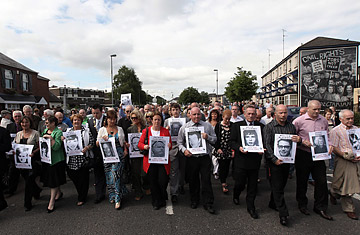
Relatives of those killed during Bloody Sunday make their way from the Bogside to the Guildhall to read the Saville report in Londonderry, Northern Ireland, on June 15
It took 12 years, 900 witnesses and around 30 million words of written evidence to form the verdict that Liam Wray has waited more than three decades to hear. His brother, a civilian shot dead by British troops in one of Northern Ireland's worst atrocities, was innocent.
Jim Wray was one of 13 people — including six 17-year-olds — who were killed when British paratroopers opened fire on a civil rights march in Londonderry in January 1972. Another man died of his injuries some months later. The exact events of that day have long been disputed. Soldiers claimed they had come under gunfire from protesters and had fired back in self-defense. But the families of those who died have always denied this, maintaining that it was the army who ran amok. Many families have fought for decades to clear their loved ones' names.
On Tuesday, in a packed, sun-lit square in the center of Londonderry, that moment finally arrived. A crowd of 5,000 people gathered in front of giant TV screens to watch British Prime Minister David Cameron deliver the findings of a 12-year inquiry into what became known as Bloody Sunday. In his final report, Lord Saville, the British judge who chaired the investigation, stated that all those who died were innocent, unarmed and posed no threat to the soldiers. The report describes how some victims were shot in the back as they fled from the army or were fired on as they tended to the wounded.
"What the families have said for 38 years has finally come true today," said Liam Wray, standing in front of a 12-foot-tall portrait of his brother. "The soldiers who lied about our dead relatives now have to carry that shame. We have been vindicated, the people of Derry have been vindicated and those who believe in truth and justice have been vindicated."
It was an emotional day for the families of the victims. Before the inquiry's findings were made public, siblings and children of the dead walked the same route of the 1972 march that their relatives had failed to complete. The crowd arrived outside Londonderry's Guild Hall to hear Cameron say he was deeply sorry for the actions of British troops that day. The Prime Minister described the killings as "unjustified and unjustifiable" and said he could not defend the indefensible.
This isn't the first time the Bloody Sunday deaths have been investigated. In 1972, an inquiry chaired by the British judge Lord Widgery largely exonerated the soldiers, merely chiding them for behavior that bordered on the reckless. After pressure from victims' families, who dubbed the report the "Widgery Whitewash," former British Prime Minister Tony Blair agreed to a new inquiry in 1998, on the grounds that there was compelling new evidence to be investigated.
The Saville report duly answered many of the questions that remained about Bloody Sunday. It concluded that it was British soldiers who had fired the first shots — not rogue elements among the marchers, as some had claimed. The report also stated that members of the military had knowingly lied before the inquiry in order to try to justify the shootings. On Tuesday, one of the biggest cheers came when relatives of the Bloody Sunday victims tore up a copy of the Widgery report and tossed it into the crowd.
But the latest Bloody Sunday inquiry is not without its critics. Intended to only last a year, it took 12 to complete, at a cost of almost $295 million. Most of the money was spent on lawyers' fees. As Northern Ireland seeks to move on from decades of sectarian conflict, many have also questioned the merit of revisiting such a painful episode of its past.
"I make no apology for the cost [of the inquiry]," says Kevin McKinney, whose father Gerry died on Bloody Sunday. McKinney spoke to TIME while holding the full 5,000-page report in his arms. He says he will read every word. "The truth wouldn't have cost anything if the army had been truthful about what happened at the beginning," he says. "There was a cover-up here for a long time and this inquiry was the only way to get the truth out."
Before the report was released, there was much speculation around what Saville would reveal about the actions of Martin McGuinness, Northern Ireland's Deputy First Minister, who was a leading member of the militant Irish Republican Army in Londonderry at the time. According to a British intelligence agent's testimony during the inquiry, McGuinness had fired at soldiers before they began to shoot at the marchers. McGuinness has denied the claim. In the end, the report was vague on McGuinness' actions, stating that he had probably fired a sub-machine gun on the day, but that he had not given the soldiers any reason to open fire on the marchers.
Now it is up to Northern Ireland's Public Prosecution Service to decide whether any of the soldiers responsible for the Bloody Sunday killings should face criminal charges and, possibly, a prison sentence. But for many relatives of those killed, that may be a step too far. "I'm not looking for a pound of flesh," says Kevin McKinney. "I can forgive the soldier who shot my father. Our loved ones were innocent but they had no voice. Today, their voice has finally been heard."
